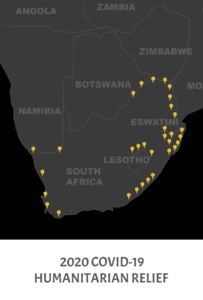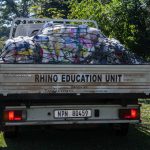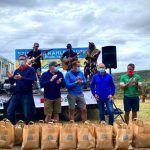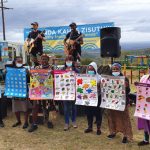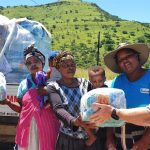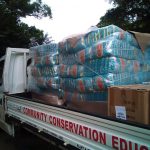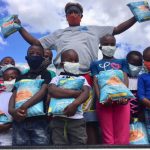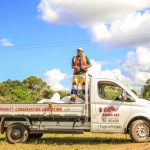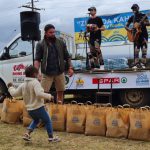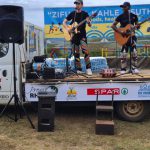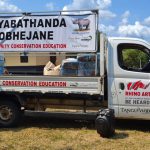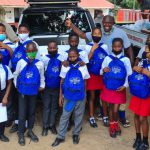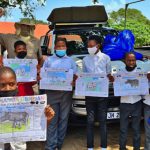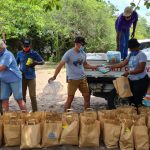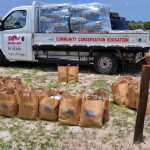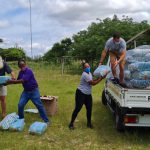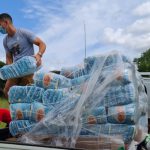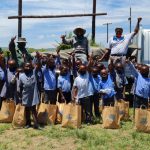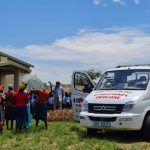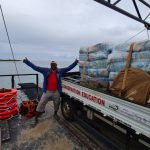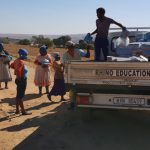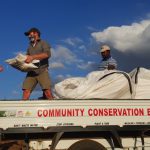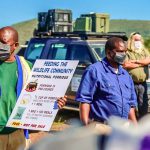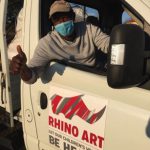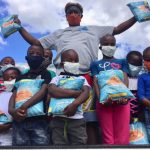2020 will go down in the annals of history as the year the global Covid-19 pandemic brought the world to a complete standstill. With borders closed and almost every country locked down, all our plans for an exciting, new world-first Land Rover transcontinental geographic expedition with loads of humanitarian work throughout Africa were put on ice. At the same time, humanitarian challenges within South Africa brought about by the Covid-19 pandemic and quickly became apparent. Just four weeks into South Africa’s hard lockdown, a nationwide crisis of escalating, widespread hunger developed in poor communities.
FEEDING THE WIDLIFE COMMUNITY
In the large, impoverished, rural communities bordering conservation areas, dire food shortages rapidly became noticeable – a direct result of the complete collapse of the tourism sector and the thousands of jobs and income that were dependant on it, plus incalculable retrenchments and layoffs of family breadwinners working in towns and cities. Yet, whilst hundreds of concerned organisations and individuals began organising food relief appeals to help urban communities, needy people living in deeply rural areas were largely ignored by national food relief campaigns.
And so, with the support of our friends at Land Rover, Goodbye Malaria, the DoMore Foundation and other partners, in April 2020 a Covid-19 Hunger Relief campaign called ‘Feeding the Wildlife Community’ was speedily formed by a group of caring conservationists, volunteers and the Kingsley Holgate Foundation.
For the next 12 months – including the 16,000Km, 80-day Mzansi Edge Expedition – and with the fantastic support of community liaison staff from 30 national parks and private/community-owned game reserves, our expedition Land Rovers (loaded with camping kit to maintain social distancing during nights spent in outlying areas) and often joined by volunteers in their own Landies, zigzagged along endless corrugated dirt roads to reach forgotten communities bordering wildlife parks, delivering tonnes of nutritional, vitamin-enriched porridge packs, food parcels, facemasks and Covid-19 health tips.
The logistical work and team effort required to directly deliver nutritional food to difficult-to-reach outlying communities was immense, but we were always careful to follow protocol by working through the Amakosi and Indunas who identified the most destitute homesteads and we maintained strict sanitizing, mask-wearing and social distancing rules.
By the end of March 2021, the campaign had delivered 1,235 million nutritional meals to thousands of food-scarce families, as well as to children at 50 creches in rural communities bordering conservation areas, along with tens of thousands of colourful, reusable ‘shweshwe’ cloth facemasks (donated by our friends at Goodbye Malaria) and sanitizing soap, as well as dozens of digital thermometers and Covid-19 health guidelines.
WATER PURIFICATION
In partnership with Tembe Elephant Lodge, we purchased and installed a 10,000-litre water tank at the Tembe Rainbow ECD Centre, which had no potable water for the 35 children in its care, and facilitated 2,5Km of durable piping for the construction of a borehole-fed waterline in the water-scarce region around Tembe Elephant Park. 2,500 rural people now have daily access to clean drinking water.
MASHOZI’S RITE TO SIGHT AND CONSERVATION EDUCATION
Our Mashozi’s Rite to Sight campaign, which provideseye tests and reading glasses to mostly elderly community residents resumed in early 2021, along with the re-start of the Rhino Art youth conservation education programme, which was put on hold due to school closures during the Covid-19 nationwide lockdown in 2020, but always with strict social distancing, mask-wearing and sanitizing protocols.
THANK YOU
We pay tribute to the hundreds of individuals – past expedition members, conservation colleagues, old and new friends and the staff at 30 game reserves – who voluntarily participated in this mammoth team effort. A very big thank you also to the Feeding the Wildlife Community campaign’s key partners, without whom this Covid-19 humanitarian endeavour would not have helped thousands of rural families and children:
- Land Rover South Africa and Land Rover’s Springbok Ambassadors
- Goodbye Malaria
- The Do More Foundation & RCL Foods (nutritional porridge packs)
- University of Potchefstroom (CFAM nutritional porridge packs)
- Ashton College, Grace Family Church and His Way Outreach in Ballito (family-size food parcels)
- Project Rhino – especially Grant Fowlds and Richard Mabanga, who converted his 2-tonne ‘Rhino Rig’ (normally used for the Rhino Art education programme) into a food-carrying, nutritional education unit and clocked up 70,000 hard kilometres.
- Nkombe Rhino – especially Joe and Willem Pietersen and Chris Small
- Isibindi Foundation
- Hlokomela
- The Spar Group
- Tembe Elephant Lodge
- Kosi Bay Lodge
- Barrows
- SANParks
- 4×4 Megaworld Upington
- Rotary Club Ladybrand
NATIONAL PARKS AND PRIVATE/COMMUNITY-OWNED GAME RESERVE PARTNERS
KwaZulu-Natal:
Babanango, Loziba, Thula Thula, Manyoni, Thanda, Munyawana Conservancy, Somkhanda, Pongola Private, Pongola Nature Reserve, Ven-Africa, Mkhuze Falls, Hluhluwe-Imfolozi Park, Mkhuze, Tembe Elephant Park, iSimangaliso Wetland Park.
Mpumalanga/Limpopo:
Songimvelo, Kruger National Park, Balule, Manyaleti, Sabi-Sands, Klaserie.
North West Province:
Mapungubwe National Park, Mpesu & Limpoqwena private game reserves, Madikwe National Park
Northern Cape:
Augrabies Falls National Park, Kalagadi Transfrontier Park, Richtersveldt National Park
Eastern Cape:
Amakhala and Shamwari private game reserves
Free State:
Golden Gate National Park
 ,
,  ,
,  ,
, 